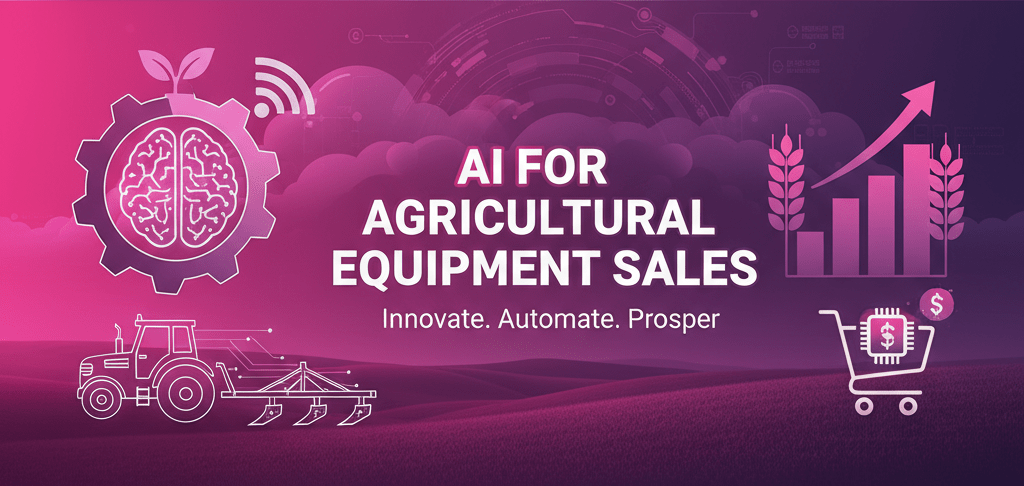“Use AI for Agricultural Equipment Sales to follow up on leads, qualify prospects, and book demos instantly—boost your dealership’s sales!”
The sun beats down on the fields. Farmers are busy, no doubt about it. They manage crops, maintain equipment, and make decisions that impact their livelihood. Their time is precious. So when a farmer expresses interest in new agricultural equipment – maybe a shiny new tractor, a more efficient combine, or advanced planting machinery – that interest is a golden opportunity.
But here’s the rub: that golden opportunity can quickly turn cold if not handled with speed and precision. The agricultural equipment sales cycle is unique. It’s not like selling a consumer gadget. Decisions are big. Investments are substantial. And the sales process often starts with a fleeting moment of interest – a quick inquiry at a trade show, a form filled out on a website, a casual call.
For ag equipment dealers, standing out in a competitive market means more than just having the best machines. It means having the best follow-up. It means being the first to connect, the most persistent, and the most helpful. This is where many dealerships, despite their best intentions, can stumble.
Think about it. A busy sales rep juggles multiple tasks. They’re on the lot, talking to walk-ins. They’re out in the field, delivering parts. They’re managing existing customer relationships. A new web lead comes in. It’s exciting! But then what? Does it sit in an inbox for an hour? A day? By then, a competitor might have already made contact. That’s a lost opportunity.
This guide tackles that challenge head-on. We’ll explore the critical importance of immediate and persistent outreach in the agricultural equipment sales process. Then, we’ll introduce a game-changing solution: an AI Sales Assistant. This isn’t some futuristic fantasy. It’s a practical, powerful tool, like SalesCloser.ai, designed to ensure every single lead gets the attention it deserves, instantly, thoroughly, and consistently.

The Unique Beat of the Ag Equipment Sales Cycle
Selling agricultural equipment isn’t like selling cars. It’s often more complex. The buyer, a farmer, has specific needs. These needs are tied to their land, crops, existing fleet, and budget.
Lead Sources: Where do they come from?
- Trade Shows & Field Days: These are huge. Farmers see the latest tech. They talk to reps. They get excited. Many leads come from these events. Business cards are exchanged. Forms are filled. These leads are often hot.
- Online Inquiries: A farmer visits your website. They browse inventory. They might fill out a “request a quote” form. Or they download a brochure. This shows clear interest.
- Phone Calls: Sometimes, a direct call is necessary. They might ask about a specific model. Or general pricing.
- Referrals: Word of mouth is a significant factor in rural communities. A happy customer tells a neighbor.
The Farmer’s Buying Journey:
It’s rarely impulsive. Farmers do their homework. They research brands. They compare features. They talk to other farmers. They consider ROI (Return on Investment). A new piece of equipment is a significant capital expenditure. It must justify its cost through increased efficiency, productivity, or reduced labor.
The Role of the Dealer:
You’re not just selling a machine. You’re selling a solution. You’re expertise in sales. Farmers rely on their dealers for support. This includes parts, service, and advice. Building trust is paramount.
Why Immediate Follow-Up is Non-Negotiable
Consider this scenario: A farmer, let’s call him Mark, just spent an hour on your website. He’s looking at a new 150 HP tractor. He fills out a “Get a Quote” form. He’s actively thinking about this purchase. His interest level is high.
What happens next?
Scenario 1: Delayed Follow-Up
Your sales rep, Sarah, is busy. She’s helping a customer pick up parts. She sees Mark two hours later. By then, Mark has also filled out a form on your competitor’s website. Your competitor’s rep called him within 10 minutes. Who do you think Mark is more likely to engage with? The one who called first. The one who showed immediate interest.
Scenario 2: Immediate Follow-Up (the ideal)
Your dealership has a system in place. As soon as Mark hits “submit,” his information triggers an action. Within minutes, he gets a call. Not a generic email, but a real-time conversation. This immediate response makes a huge difference.
The “Why” Behind the Urgency:
- Strike While the Iron is Hot: People are most receptive when their interest is piqued. The longer you wait, the more their attention wanes. Other distractions crop up.
- Beat the Competition: In a competitive market, being first matters. The first to connect often sets the agenda. They establish rapport. They start the qualification process.
- Show You Value Their Time: Farmers are busy. A prompt response shows you respect their time. It demonstrates professionalism. It builds confidence in your dealership.
- Prevent Lead Leakage: Leads are expensive to generate. Don’t let them slip through the cracks. Every uncontacted lead is money wasted.
- Set the Pace: An immediate follow-up allows you to control the narrative. You can guide the conversation. You can offer solutions. You can schedule the next step.
The Challenge: Manual Follow-Up is Hard
Let’s be realistic. Sales reps are human. They have limits. They can’t be everywhere at once. They can’t call every web lead the second it comes in, 24/7.
- Time Constraints: Reps have quotas. They have existing customers. They have paperwork. New leads often take a backseat to immediate demands.
- Lead Volume: During peak seasons or after a big trade show, lead volume can explode. A small sales team can quickly get overwhelmed.
- Inconsistency: Some representatives are more effective at follow-up than others. This leads to inconsistent customer experiences. It means some good leads get missed.
- Burnout: Constant, manual outreach is tiring. It’s repetitive. It can lead to burnout for your sales team.
- “Cold” Calls: By the time a rep reaches a lead, it may have cooled significantly. This makes the call harder. It reduces the chance of success.
This is the gap. This is where valuable leads often fall through the cracks. This is where potential sales are lost. But what if there was a way to bridge this gap? What if you could have a tireless assistant, working around the clock, to ensure every single lead receives immediate, intelligent, and persistent attention?
Introducing Your Tireless AI Sales Assistant (e.g., SalesCloser.ai)
Imagine having a dedicated team member whose sole purpose is to follow up on every new lead, instantly, consistently, and intelligently. This isn’t a fantasy. It’s what an AI Sales Assistant, like SalesCloser.ai, delivers.
Think of it as your dealership’s newest, most efficient employee. This AI agent works 24/7. It never takes a break. It never gets tired. Its mission: to engage every lead the moment it arrives.
What is an AI Sales Assistant?
It’s a sophisticated software system. It uses artificial intelligence. It can understand natural language. It can hold conversations. It can ask questions. It can process answers. It can even schedule appointments. All without human intervention.
How it Changes the Game for Ag Equipment Dealers:
- Instant Engagement: The Speed Advantage
- The Moment a Lead Hits: A farmer submits a web form. An email notification goes out to your team. Simultaneously, the AI Sales Assistant springs into action.
- Immediate Call: Within seconds, the AI makes a call to the farmer. This isn’t an automated message. It’s an intelligent, conversational agent.
- First to Connect: You are instantly ahead of your competition. You show immediate interest. You capture the lead’s attention while it’s fresh.
- Example Dialogue: “Hello, this is [Your Dealership Name] calling in response to your recent inquiry about agricultural equipment. We just saw your interest online. How can I help you today?”
- Intelligent Lead Qualification: Knowing What Matters
- Beyond the Initial Contact: The AI doesn’t just say “hello.” It asks targeted questions. It listens to the farmer’s responses.
- Specific Equipment Interest: “Are you looking for a new tractor, perhaps a combine, or something else for your operation?”
- Usage Needs: “What kind of work do you primarily do with your equipment? What size of acreage are you working?”
- Timeframe to Purchase: “Are you looking to make a purchase in the next few weeks, or further down the line?”
- Budget Insights: “Do you have a general budget in mind for this investment?”
- Information Gathering: The AI collects crucial data. This data is then recorded. It’s passed directly to your sales team. This means your human sales reps get qualified leads. They get leads with context.
- Filtering Out Non-Serious Inquiries: Not every lead is ready to make a purchase. The AI can quickly identify those who are less severe. This saves your reps valuable time. They focus only on qualified, interested prospects.
- Automated Demo & Appointment Scheduling: The Seamless Hand-off
- The Goal: The Next Step: The primary aim of the AI is to move the lead forward. Often, this means scheduling a demo. Or a call with a sales expert.
- Real-Time Calendar Integration: The AI integrates with your sales team’s calendars. It sees their availability. It offers suitable time slots to the farmer.
- Farmer’s Convenience: “Would next Tuesday at 10 AM work for an on-site demo, or would you prefer a call with one of our specialists later this week?”
- Confirmation & Reminders: Once a time is chosen, the AI sends a confirmation. It can also send reminders. This reduces no-shows.
- Direct to Your Sales Team: The AI books the appointment directly into the rep’s calendar. The rep receives all the qualified lead information. They know exactly what the farmer is looking for. They arrive prepared.
- Persistent Follow-Up: Never Let a Lead Go Cold
- More Than One Attempt: Sometimes, a lead doesn’t answer the first call. That’s normal. The AI doesn’t give up.
- Multi-Channel Approach: Try calling again. It can send a follow-up text. Or an email. All with personalized messages.
- Consistent Nurturing: This persistence ensures maximum contact rates. It keeps your dealership top-of-mind. It prevents leads from getting lost.
- Customizable Sequences: You define the follow-up sequence. How many calls? How many texts? Over what period? The AI executes it perfectly, every time.
Real-World Impact: How This Helps Your Dealership Grow
This isn’t just about cool technology. It’s about tangible business results.
- Increased Sales & Revenue: More qualified leads mean more demos. More demos mean more sales. It’s a direct path to higher revenue.
- Improved Lead Conversion Rates: By engaging leads promptly and qualifying them effectively, you significantly increase the chances of converting an inquiry into a sale.
- Boosted Sales Team Productivity: Your human sales reps spend less time on cold calls. They spend less time on unqualified leads. They focus on what they do best: building relationships and closing deals. This makes their time more efficient.
- Enhanced Customer Experience: Farmers appreciate prompt service. They value being heard. The AI ensures every inquiry gets a professional, immediate response. This builds trust and loyalty.
- 24/7 Coverage: Your dealership effectively has a sales assistant working around the clock. Leads from late-night web inquiries or weekend trade shows get immediate attention. No more waiting until Monday morning.
- Better Data & Insights: The AI collects valuable data from every interaction. This data can inform your marketing strategies. It can help you better understand your customer base.
- Scalability: As your dealership grows, your AI Sales Assistant scales with you. It handles any volume of leads without needing more staff.
- Competitive Edge: Many competitors still rely on slow, manual processes. By adopting AI, you position your dealership as modern, efficient, and customer-focused. You gain a significant advantage.
- Reduced Operational Costs (Long Term): While there’s an initial investment, the efficiency gains and increased sales can far outweigh the costs. You optimize your existing sales force. You get more out of your marketing spend.
- Freedom for Sales Reps: Reps can focus on complex sales situations, allowing them to deliver more effective solutions. They can spend more time building deeper relationships with key clients. Initial screening calls do not overwhelm them.
Integrating AI with Your Existing Systems (e.g., Dealer Management System)
A good AI Sales Assistant doesn’t operate in a vacuum. It integrates seamlessly with your existing tools. This is key for efficiency.
- CRM (Customer Relationship Management) System: The AI should push all captured lead data directly into your CRM. This includes contact details. It provides equipment interest. It includes preferred demo times. This keeps all your customer information in one central place. Everyone on your team has access to the same up-to-date information.
- DMS (Dealer Management System): Many dealerships use a DMS for inventory, parts, and service. While the direct integration may be less immediate than a CRM, the information gathered by the AI can inform broader insights. For example, if the AI identifies high interest in a specific tractor model, this data can inform your inventory ordering.
- Calendar Tools: For demo scheduling, integration with Google Calendar, Outlook Calendar, or similar tools is essential. This ensures accuracy. It avoids double bookings.
- Website Lead Forms: The AI triggers directly from your website’s lead forms. This is the starting point for instant engagement.
Beyond Lead Follow-Up: Other Applications for AI in Ag Dealerships
While lead follow-up is a powerful starting point, the capabilities of AI extend further. Consider these possibilities:
- Parts and Service Inquiries: An AI agent could handle initial inquiries about parts availability. “I need a filter for a John Deere 8R series tractor.” The AI could then check inventory. Or it could direct the customer to the correct department.
- Service Appointment Booking: Customers could interact with an AI to schedule routine maintenance. “I need to get my combine serviced before harvest.” The AI could find available slots.
- Frequently Asked Questions (FAQs): The AI can answer common questions. “What are your hours?” “Do you offer financing?” This frees up your human staff.
- Post-Sale Check-ins: The AI could follow up after a purchase. “How are you enjoying your new tractor?” “Do you have any questions about its operation?” This builds customer loyalty.
- Marketing Campaign Support: The AI can follow up on specific marketing campaigns. “You recently clicked on our ad for new sprayer technology. Are you interested in learning more?”
These examples show how AI can support various aspects of your rural business. It automates repetitive tasks. It improves customer service. It ultimately helps you grow your dealership.
Overcoming Potential Objections & Concerns
It’s natural to have questions about new technology. Let’s address some common concerns:
“Won’t farmers prefer talking to a real person?”
Absolutely! The AI is not designed to replace your sales reps. It’s designed to enhance their work. It ensures that when a farmer does talk to a real person, that person is well-informed and the farmer is already qualified and engaged. The AI acts as the crucial first point of contact. It gets the conversation started. It sets the stage for your human reps to shine. Many farmers are comfortable with technology. They appreciate speed and efficiency.
“Is it difficult to set up and manage?”
Reputable AI Sales Assistant providers, like SalesCloser.ai, offer intuitive platforms. They often provide onboarding and support. The goal is to make it easy for dealerships to implement and use. You don’t need to be a tech expert.
“What about data privacy and security?”
This is paramount. Choose a provider with robust security measures. Ensure they comply with relevant data protection regulations. Most modern AI platforms are built with security in mind.
“Will it sound robotic or unnatural?”
Modern AI is incredibly sophisticated. It uses natural language processing. It’s designed to sound human-like. It adapts its speech patterns. It can even handle accents. The goal is a smooth, professional, and conversational experience.
“Is it expensive?”
Consider the cost of lost leads. Consider the cost of inefficient sales processes. The ROI (Return on Investment) from increased sales and improved productivity often justifies the investment quickly. It’s about working smarter, not just harder.
The Path Forward: Taking Action
The agricultural equipment market is dynamic. Farmers are adopting new technologies in their fields. Dealers must also embrace new technologies in their sales offices.
To get started, consider these steps:
- Assess Your Current Lead Follow-Up: How quickly do you currently respond to web leads? What is your current lead conversion rate? Identify your pain points.
- Research AI Sales Assistant Solutions: Look for platforms specifically designed for sales and marketing purposes. Look for those with features like instant calling, intelligent qualification, and calendar integration. (e.g., SalesCloser.ai).
- Request a Demo: See the AI in action. Understand how it integrates with your existing workflow. Ask questions.
- Start Small, Scale Up: Perhaps begin with web leads only. Once you see the benefits, expand to other lead sources.
- Train Your Team: Ensure your sales reps understand how the AI works. Show them how it helps them. Emphasize that it’s a tool to make their jobs easier and more successful.
- Monitor and Optimize: Continuously track performance to ensure optimal results. Adjust the AI’s scripts as needed. Refine your follow-up processes based on the data you collect.
Conclusion: Empowering Your Dealership for the Future
The world of agricultural equipment sales is undergoing significant evolution. Farmers expect speed. They expect efficiency. They expect personalized service. Relying solely on manual processes for lead follow-up puts your dealership at a disadvantage.
An AI Sales Assistant isn’t just a trend. It’s a strategic necessity. It’s an investment in your dealership’s future. It’s a way to ensure no lead is left behind. It guarantees every interested farmer gets immediate, intelligent, and persistent attention.
By adopting AI, you empower your sales team. You boost your conversion rates. You enhance your customer relationships. You position your dealership as a leader. You secure more sales. You ensure your business thrives. Embrace the future. Watch your dealership grow.
FAQs: AI for Agricultural Equipment Sales
Q1: What exactly is an AI Sales Assistant, and how does it differ from a chatbot?
An AI Sales Assistant is an advanced artificial intelligence program. It can conduct real-time, natural-sounding voice conversations over the phone. It actively listens to customer responses. It understands intent. It asks clarifying questions. It can also send texts and emails. It’s much more dynamic than a traditional chatbot. Chatbots typically use text-based interactions. They often follow pre-defined scripts. An AI Sales Assistant is conversational. It’s adaptive. It aims to qualify leads or schedule appointments.
Q2: How quickly can an AI Sales Assistant follow up on a new lead?
Instantly. As soon as a lead enters your system, for example, through a web form, the AI Sales Assistant can initiate contact. This often means a phone call within seconds. This immediate response is crucial. It captures the lead’s attention while their interest is highest.
Q3: Will the AI replace my human sales team?
No, the AI Sales Assistant is a tool to support and enhance your human sales team. It handles the initial, repetitive, and time-consuming tasks. It qualifies leads. It schedules appointments. This frees up your human reps. They can focus on building relationships. They can focus on closing deals. They handle more complex customer needs. It makes your human sales team more productive and effective.
Q4: Can the AI understand specific agricultural terms or equipment names?
Yes, modern AI platforms are very sophisticated. They use natural language processing (NLP). You can train the AI with industry-specific terminology. This includes equipment names (e.g., “combine,” “planter,” “skid steer”). It includes agricultural practices. This ensures that the AI accurately understands the needs of farmers. It allows for more relevant conversations.
Q5: What kind of information can the AI collect from a lead?
The AI can collect a wide range of information. This includes:
- Specific equipment interest (e.g., “new tractor,” “used sprayer”).
- Preferred features or specifications.
- Intended use or type of farming operation.
- Acreage size.
- Timeframe for purchase.
- Budget considerations.
- Best time for a demo or follow-up call. All this information is recorded. It is then passed to your human sales reps.
Q6: How does the AI schedule demos or appointments with sales reps?
The AI integrates directly with your sales team’s digital calendars. It can see real-time availability. It offers available time slots to the farmer. Once the farmer chooses a time, the AI books the appointment. It then sends confirmations and reminders to both the farmer and the sales rep. This automation streamlines the process. It reduces manual errors.
Q7: Is it possible for the AI to sound natural, not robotic, on the phone?
Yes, significant advancements have occurred in AI voice technology. Most modern AI sales assistants utilize advanced text-to-speech engines. These produce highly natural, human-like voices. They can incorporate nuances like intonation and pauses. The goal is for the farmer to have a seamless, professional conversation. They should barely notice they’re talking to an AI.
Q8: What happens if a lead doesn’t answer the first call from the AI?
The AI is designed for persistence. If a lead doesn’t answer, the AI can execute a pre-defined follow-up sequence. This might involve:
- Trying another call at a different time.
- Sending a personalized text message.
- Sending a follow-up email. This multi-channel approach maximizes the chances of connecting with the lead. It keeps your dealership top-of-mind.
Q9: Can the AI handle multiple languages, which might be important in some rural areas?
Many advanced AI Sales Assistant platforms offer multi-language support. If your dealership serves communities where multiple languages are spoken, this is a vital feature to inquire about. It allows you to broaden your reach. It offers better service.
Q10: How does an AI Sales Assistant integrate with my existing Dealer Management System (DMS) or CRM?
Most AI Sales Assistants are built with integration capabilities. They can typically connect directly with popular CRM systems (like Salesforce, HubSpot, Zoho CRM). They push all qualified lead data and conversation notes into your CRM. Integration with a specific DMS might vary. However, the data from the AI can always be easily transferred or used to update records within your DMS. This ensures data consistency. It provides a complete customer view.








